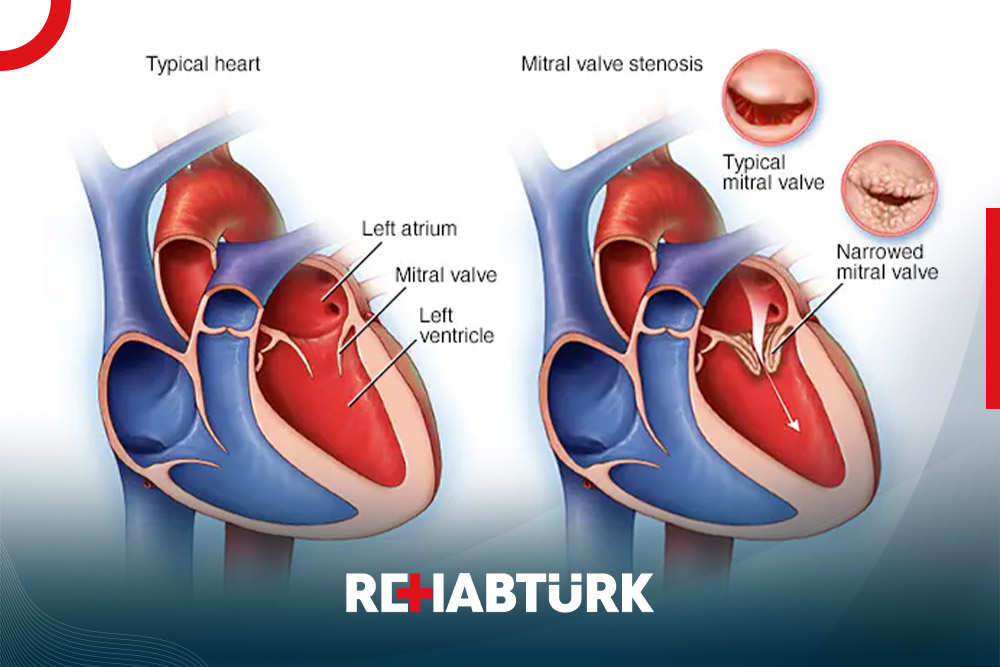Mitral valve stenosis treatment in Türkiye
Mitral valve stenosis is an operation on the mitral valve of the heart, and this happens when this valve does not open or close, which prevents blood flow to the left ventricle (the main pumping chamber), which leads to symptoms such as fatigue after performing simple exertion, shortness of breath, and other problems.

Causes of mitral valve stenosis:
The main cause of mitral valve stenosis is an infection called rheumatic fever. It is one of the complications that may occur as a result of a sore throat caused by a certain type of bacteria. It appears after the exacerbation of inflammation that occurs without being treated in a timely manner, and it is a serious autoimmune disease, but it has become rare in developed countries, but it is still common in developing countries, and scarring of the mitral valve leads to serious complications in the heart if left without treatment.
Symptoms of mitral valve stenosis:
The patient may present with symptoms of mitral stenosis or may present minor symptoms for decades. Because the progression of mitral valve symptoms is slow, a medical review should be obtained if the following symptoms appear:
- Shortness of breath, especially when exerting or lying down.
- Immediate fatigue, especially during increased physical activity.
- Swelling of the feet or legs.
- Heart palpitations, i.e. the sensation of a rapid heartbeat.
- Feeling dizzy or fainting.
- bloody cough.
- pain in chest.
Symptoms of mitral valve stenosis may appear or worsen any time your heart rate increases, such as with exercise. This is accompanied by a bout of rapid heartbeat and may occur as a result of pregnancy or other body pressures. Also, pressure that builds up in the heart is returned to the lungs in the case of stenosis, which leads to fluid buildup (congestion) and shortness of breath. Symptoms appear between the ages of 15 and 40 in developed countries, but they can occur at any age, even during childhood.
During the medical examination, the doctor finds the following:
- hole in the heart.
- Fluid buildup in the lungs.
- Arrhythmia.
When to see a doctor:
symptoms such as
- Tired.
- Shortness of breath during physical activity.
- heart palpitations or chest pain.
the reasons:
Causes of stenosis include:
Rheumatic Fever: Complications of strep throat and rheumatic fever lead to damage to the mitral valve. Because rheumatic fever is the most common cause of stenosis.
Calcium deposits: Accumulation of calcium deposits around the annulus of the mitral valve causes narrowing of the valve and this occurs with age.
Other causes: Babies are born with mitral valve stenosis (a birth defect) but this is rare. Other rare causes include radiation to the chest and some autoimmune diseases, such as lupus.
How does the heart work:
The heart is divided into two pumps that work together in harmony. The blood returning from the organs and tissues of the body enters the right side of the heart, which in turn pumps the blood to the lungs. The lungs remove carbon dioxide from the blood and replace it with oxygen. Oxygen-rich blood returning from the lungs enters the left side of the heart, which in turn re-pumps it to all parts of the body. This process ensures that there is always enough oxygen and nourishment for the body to function efficiently.
risk factors
Mitral valve stenosis is less common today than it used to be because the most common cause, rheumatic fever, is rare in the United States. However, rheumatic fever remains a problem in developing countries.
Risk factors for mitral valve stenosis include:
- A history of rheumatic fever.
- Untreated bacterial infection.
Complications:
Mitral valve stenosis strains the heart and reduces blood flow when left untreated, leading to complications:
Pulmonary artery hypertension: This is a condition in which the pressure in the arteries that carry blood from the heart to the pulmonary arteries increases, causing stress on the heart.
Heart attack: Pressure in the lungs increases due to mitral valve stenosis, which interferes with blood flow, increasing fluid buildup and straining the right side of the heart.
Cardiomegaly: The upper left chamber of the heart is enlarged due to the buildup of pressure caused by mitral valve stenosis
Atrial fibrillation: dilatation and enlargement of the left atrium leads to an irregular heartbeat in which the upper chambers of the heart beat chaotically and very quickly.
Blood clots: In the event that atrial fibrillation is not treated, it can cause blood clots to form in the left heart chamber, and then they can travel from the heart to other parts of the heart, causing serious problems such as a stroke or a stroke that blocks blood vessels in the brain.

Mitral valve stenosis in Türkiye
Türkiye is considered one of the leading countries in the field of cardiac surgery, as it was one of the few countries in the world that performs this type of complex operation
At REHABTÜRK, we understand the importance of choosing the best specialists in cardiovascular surgery
So your health is in good hands!
Where the doctors and cardiovascular surgeons in REHABTÜRK have long experience and multidisciplinary teams to provide the best treatment for patients.

